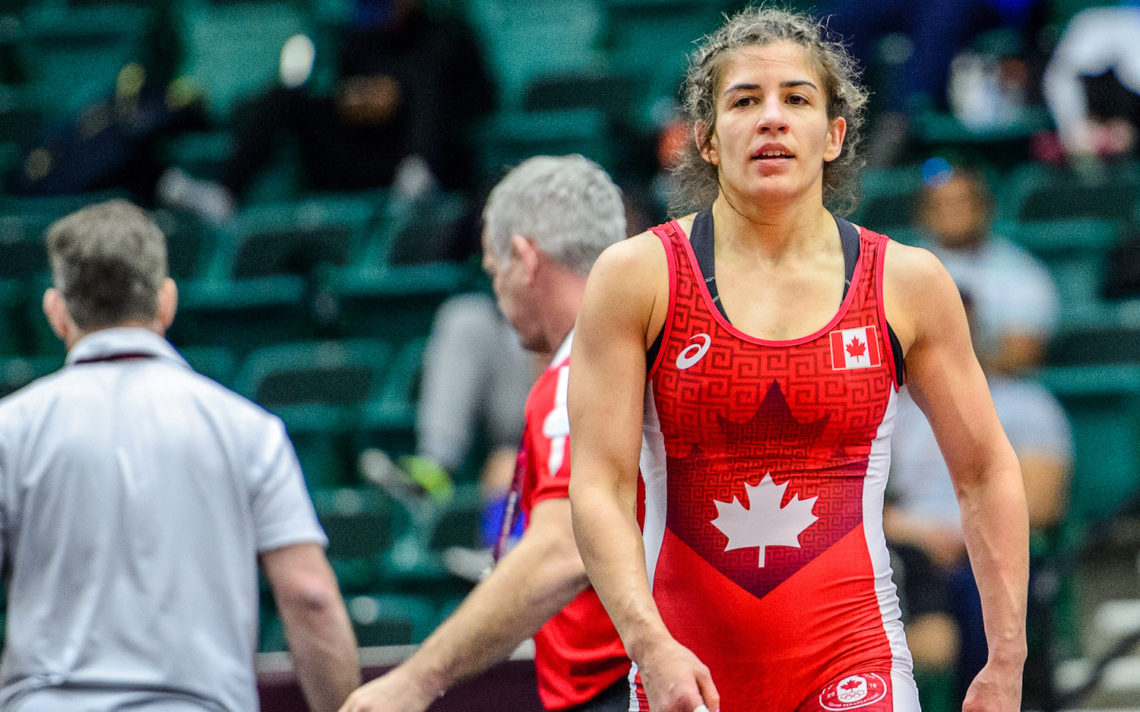
Rejuvenated wrestler captures bronze at worlds
Michelle Fazzari, shown in this file shot, won a bronze medal in August at the world wrestling championships in Paris, France. Photo by WRESTLING CANADA
It was at the 2012 Summer Olympics in London, England, where Michelle Fazzari realized she could compete with the best wrestlers in the world.
In London, she was the training partner for Brock Wrestling Club teammate Tonya Verbeek and many of the athletes in the training room Fazzari had either beaten or had close matches against.
Upon returning from London, the 2016 Games were her only focus.
“Every morning when I woke up, Rio 2016 was in my head and I trained for it,” she said. “I did really well that year but I just wasn’t good enough.”
When the Rio Olympics were over – Fazzari lost 3-1 to Turkey’s Elif Male Yesilrmak in her opening match in Brazil — she woke up one morning and wondered what was next.
“All that training wears you down,” she said. “It’s not easy. And it sucks trying to work at the same time.”
Combined with those thoughts came the loss of her funding from Wrestling Canada after seven years of support.
After years of intense training, battling through injuries and starving herself to make weight, the former three-time Canadian university champion decided to take some time off to live a ‘normal’ life.
She ate what she wanted, she had a social life and it was nice to be just a regular person. Three months later, a happy but somewhat out of shape Fazzari found herself back in the ultra-competitive environment of the Brock Wrestling Club.
“I got back in the room and wondered if I wanted to continue doing it,” she said. “Then I started having fun with it.”
Verbeek suggested she attend the Paris International at the end of January, but after several months of eating pub food and whatever else her heart desired, Fazzari didn’t relish the prospect of losing enough weight to wrestle again in the 58-kilogram division.
“It was a brutal weight cut but I had so much fun in Paris,” she said, of her gold-medal performance. “It was my first international tournament back and I didn’t care if I got pinned in 10 seconds or not. I went out and had one of the best tournaments I’ve ever had.”
She followed that up with an extremely successful international season and headed into the world championships in August riding a wave of momentum.
But when she arrived in Paris, an old nemesis returned. Fazzari has an uncanny habit of garnering the worst possible draws at major international wrestling meets. In her first match, she found herself up against Russian Koblova Zholobova, the reigning Olympic silver medalist.
“Eventually you have to make it work,” she said. “You have to beat the best to be the best.”
The 30-year-old did exactly that and then won her next match to advance to the semifinals. There she lost 10-0 to the eventual champ and reigning Olympic champ Helen Maroulis of the United States.
“There’s so many things I can change and she’s 100 per cent beatable,” Fazzari said.
The former five-time Ontario university champion rebounded quickly and defeated a Swedish opponent 7-0 in the bronze-medal match to win her first-ever world championships medal. It was a sweet moment for Fazzari, who achieved the goal she had set at the start of the year.
“I came off a 10-0 loss and Marty (coach Calder) was pretty mad, but I came in with a different attitude and perspective.”
Instead of lamenting the previous loss, she quickly moved forward.
“I had nothing to lose so I decided than I might as well have fun with it,” she said. “And that’s going to be my philosophy this year; do it because you love it.”
Unfortunately love doesn’t pay the bills and she has been forced to be extremely frugal with the loss of her funding.
“It’s an unfair system and they are changing it,” she said.
Her bronze at the worlds will get her carding money back but it won’t kick in until 2018.
“It’s going to be a rough year,” she said. “I’m just trying to survive as much as possible.”
She keeps her head above water by supply teaching at the secondary school level with the District School Board of Niagara
“I love the sport and competing and it’s definitely not for any financial gain,” she said. “After the Olympics, I was thinking I only have a couple of years left.
“I don’t know where it’s going to take me if I get a teaching job somewhere else or my partner could get a job somewhere else.”
For now, she’s going to stick with wrestling even though the next Olympics aren’t until 2020.
“But I look at it as the trials are in 2019 and it’s crazy to think that, but we are almost there. It’s so soon.”
She is taking the sport one day at a time wherever that takes her.
“Every day, no matter what I do, it will prepare me for 2020.”
But wrestling is no longer her sole focus.
“I don’t feel this is the only thing happening in my life. If another opportunity comes up, maybe I go that way.”
She knows she will miss the training when her wrestling career ends.
“There is nothing else like it,” she said. “You feel if you can do this, you can do anything else. You know how to work hard for things and how to push harder than other people.”
An attitude adjustment and that hard work has taken Fazzari to another level.
“Michelle has made big improvements in her game since the Olympics in Rio,” Calder said. “Her performance at the world championships was spectacular and puts her in great position moving forward.”
Next up for Fazzari and her elite club mates are the Commonwealth Games trials in early November.

























